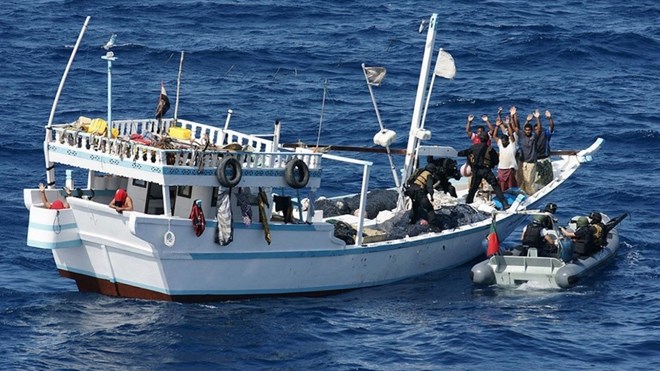
Wednesday February 19, 2025

FILE PHOTO
Mogadishu (HOL) — A suspected pirate attack on a Yemeni-flagged fishing boat was reported on February 18, off the coast of Garmaal, near Eyl in Puntland, Somalia, according to the European Union Naval Force (EUNAVFOR) Operation ATALANTA.
EUNAVFOR ATALANTA, which is tasked with combating piracy and securing maritime routes in the region, is actively coordinating with the Combined Maritime Forces (CMF), the Yemeni Coast Guard, and the Puntland Maritime Police Force (PMPF) to monitor the situation. The naval operation has yet to confirm whether the vessel was hijacked or if the attack resulted in any casualties.
This hijacking attempt follows a similar attack on February 9, when Somali pirates hijacked another Yemeni-flagged dhow, Al Najma, near Eyl. The vessel, carrying 12 crew members, was seized before EUNAVFOR forces intervened, prompting the pirates to flee after robbing the crew. The dhow was eventually freed on February 13.
The resurgence of piracy in Somali waters comes after years of decline attributed to international naval patrols, strengthened maritime security, and a more stable government in Mogadishu. However, the recent escalation coincides with broader regional instability, particularly in the Red Sea, where Yemen’s Houthi rebels have launched attacks on commercial vessels amid the ongoing Israel-Gaza conflict.
According to the International Maritime Bureau, there were seven reported piracy incidents off Somalia in 2024, a notable increase after a prolonged period of relative calm. Experts suggest that economic hardships, weakened maritime security due to shifting naval priorities, and ongoing regional conflicts have allowed pirate groups to reemerge.
Somalia’s federal government and Puntland authorities have expressed concerns over the resurgence of piracy, warning that it could undermine regional security efforts. Puntland, which operates its own maritime police force, has called for additional international support to strengthen coastal patrols and prevent piracy from regaining a foothold. The Somali government has also urged commercial shipping operators to adhere to best maritime security practices to mitigate risks.
In response to these incidents, Operation ATALANTA has urged all merchant vessels and fishing boats operating in the region to register with the Maritime Security Centre – Indian Ocean (MSCIO) Voluntary Registration Scheme (VRS). This initiative aims to enhance monitoring capabilities and facilitate rapid responses to security threats.
EUNAVFOR ATALANTA has also intensified its engagement with local fishermen through “Friendly Approaches,” a strategy designed to build trust, provide security guidance, and deter potential pirate activity. However, experts warn that without sustained international efforts, Somali piracy could once again become a major threat to global shipping.
Piracy off the Somali coast peaked in 2011 when 237 attacks were reported, costing the global economy an estimated $7 billion, including $160 million in ransom payments, according to the Oceans Beyond Piracy monitoring group. Over the past decade, increased naval patrols, regional security initiatives, and private security measures contributed to the significant decline in attacks.
However, the resurgence of attacks in 2024 and early 2025 suggests that some root causes of piracy—such as economic deprivation, limited governance in coastal regions, and political instability—remain unresolved. Climate change-induced resource scarcity, economic downturns, and the shifting focus of international naval forces to other security threats has left a security vacuum along Somalia’s coastline.
As international attention remains focused on conflicts in the Red Sea and the Ukraine war, concerns are growing that Somali piracy may escalate further if left unchecked.
The investigation into the latest attack near Garmaal remains ongoing, with EUNAVFOR and its partners working to determine the full details and prevent future incidents.